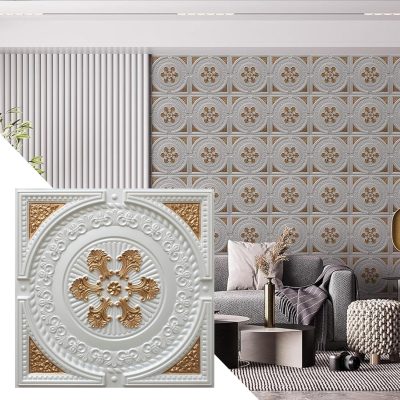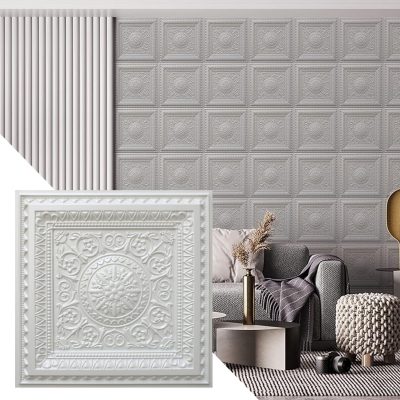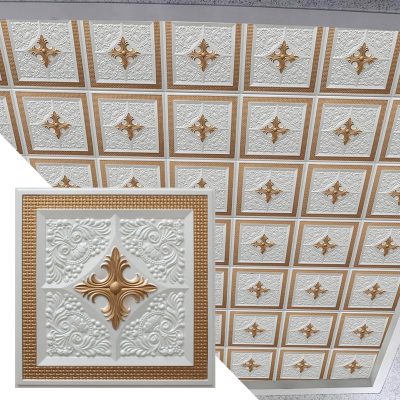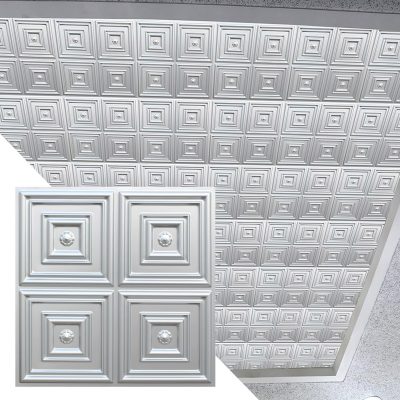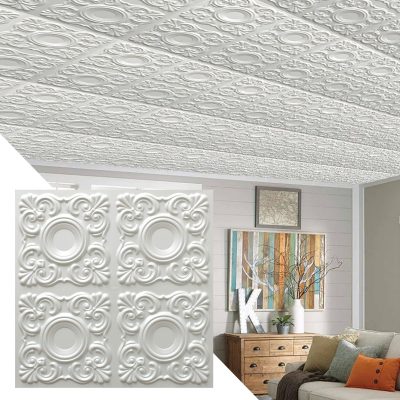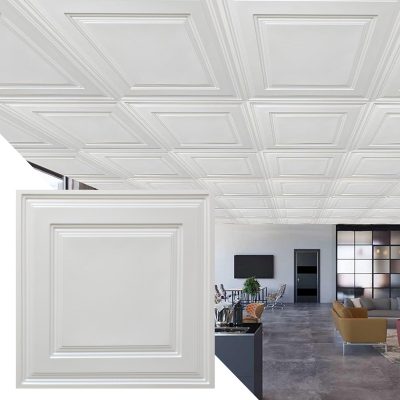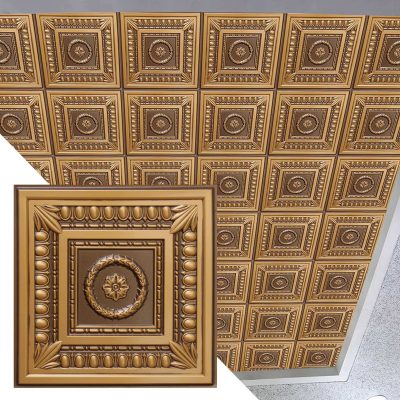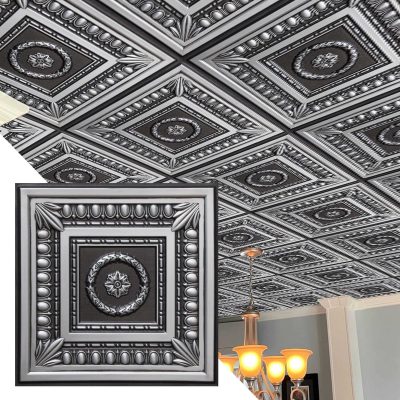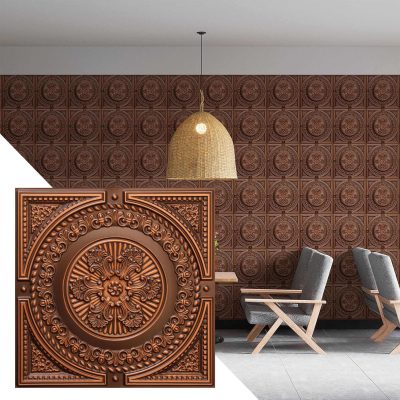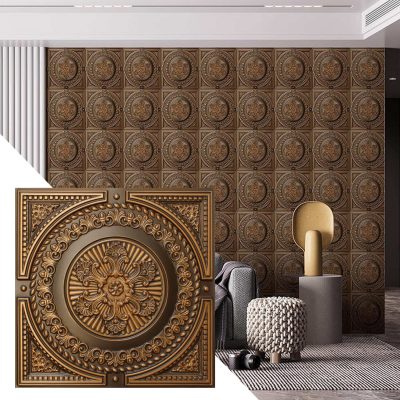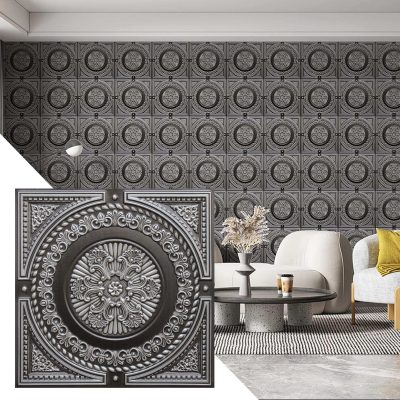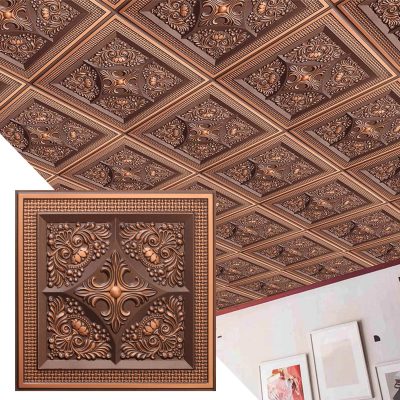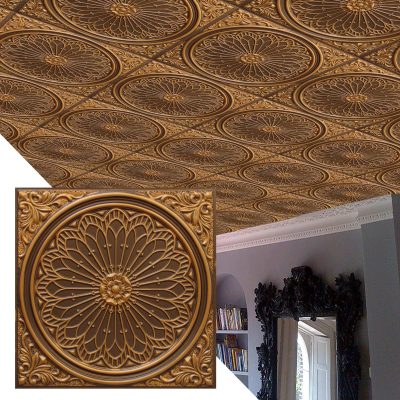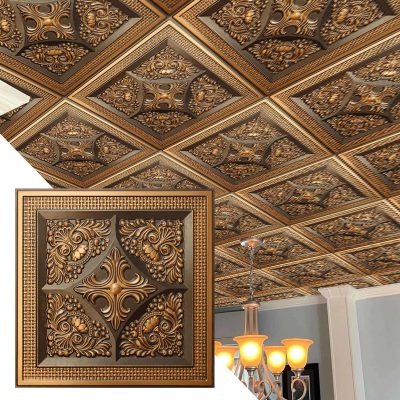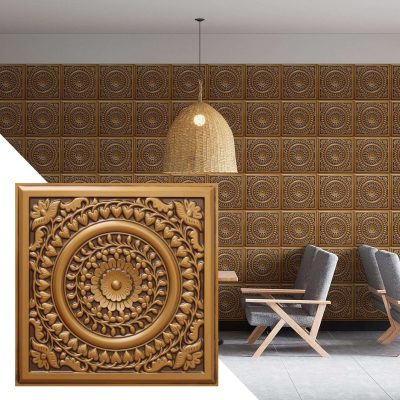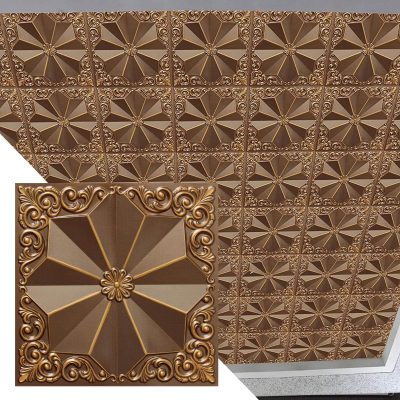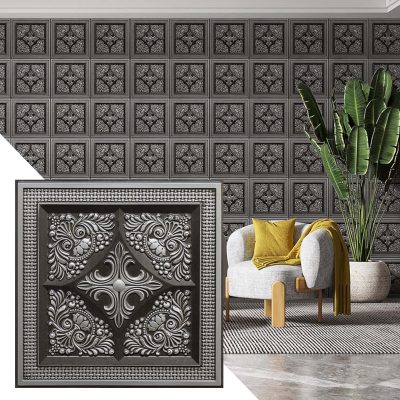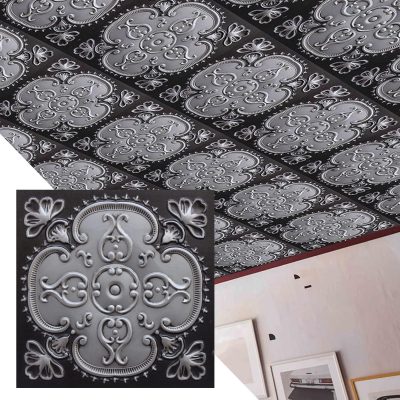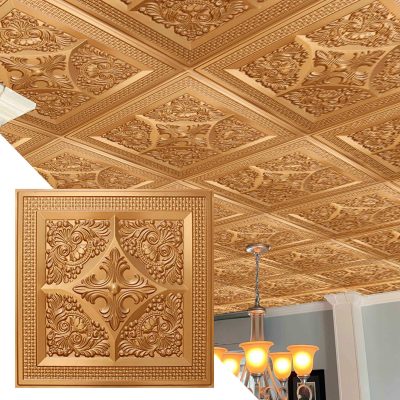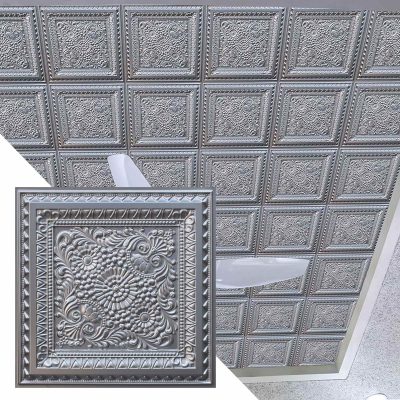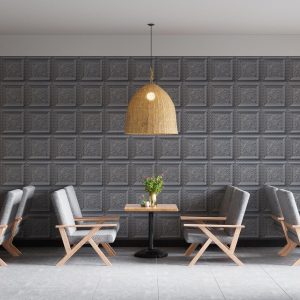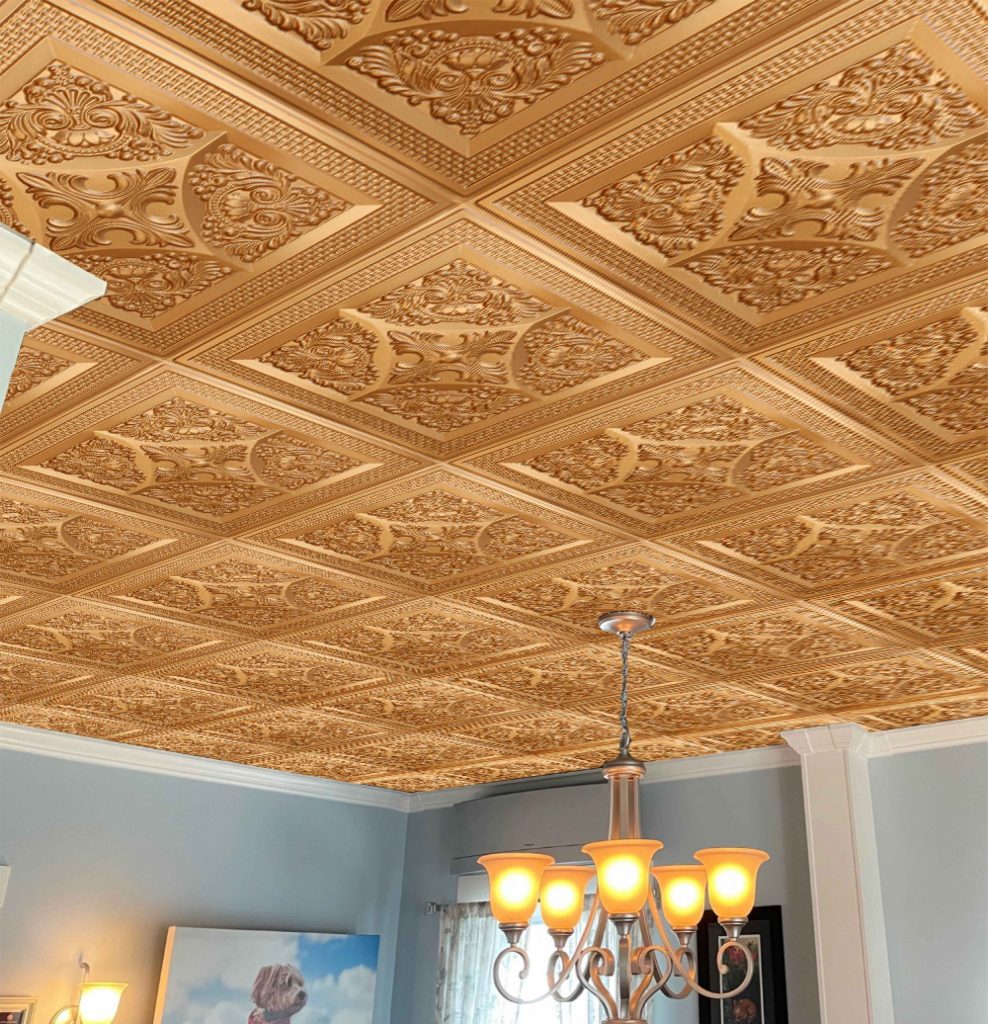No products in the cart.
Home > Ceiling Tiles
Ceiling Tiles
Ceiling Panels and Tiles
Ceiling tiles can be a stunning feature in any home’s interior design, and with the amazing selection of 2024 options available from Residential Panels, you’ll love creating your own unique look. We offer various interior ceiling solutions, from contemporary and modern designs to traditional antique decorative 3D sheets and panels for drop ceilings. Find the perfect style and stay within budget to transform your building space into the look you dream of. Whether looking for an eye-catching statement piece or more subtle elegance, PVC ceiling tiles provide limitless possibilities that will bring out your inner designer.
Filter Products
By Pattern
- Beach(0)
- Beads(0)
- Birds(0)
- Bubbles(0)
- Buildings(0)
- Butterfly(0)
- Chevron(0)
- Circle(0)
- Cobweb(0)
- Corals(0)
- Criss-Cross(0)
- Diamond(0)
- Dolphin(0)
- Hexahedrons(0)
- Ikat(0)
- Jacobean(0)
- Koi Fish(0)
- Leaf(0)
- Letters(0)
- Lines(0)
- Lotus(0)
- Marble(0)
- Modern(0)
- Mosaic(0)
- Nature(0)
- Ocean(0)
- Octagon(0)
- Palm Trees(0)
- Patchwork(0)
- Paws(0)
- Pebbles(0)
- Pebbles and Sea Shell(0)
- Plain(0)
- Quatrefoil(0)
- Rhombus(0)
- Rustic(0)
- Sea Creatures(0)
- Sea Pebbles(0)
- Sea Shell(0)
- Seashell(0)
- Slate(0)
- Stone(0)
- Succulent(0)
- Tile(0)
- Tulip(0)
- Vines(0)
- Waves(0)
- Weave(0)
- Wood(0)
- X(0)
- Cement(0)
- Concrete(0)
- Fruits(0)
- Patriotic(0)
- Slate Stone(0)
- Terrazzo(0)
- Animals(0)
- Bricks(0)
- Contemporary(0)
- Country(0)
- Damask(0)
- Distressed(0)
- Floral(0)
- Abstract(0)
- Floral & Flowers(0)
- Geometric(0)
- Glitter(0)
- Kids(0)
- Kitchen(0)
- Outdoors(0)
- Random(0)
- Sports(0)
- Stars(0)
- Stripes(0)
- Traditional(0)
- Victorian(0)
- Vintage(3)
By Thickness
- 0.08(0)
- 0.12(0)
- 0.15(0)
- 0.16(0)
- 0.18(0)
- 2(0)
By Color
- Aegean(0)
- Alabaster(0)
- Antique(0)
- Antique Brass(1)
- Antique Copper(5)
- Antique Gold(17)
- Antique Silver(7)
- Aquamarine(0)
- Ash(0)
- Beige(0)
- Black(0)
- Ble(0)
- Blonde(0)
- Blue(0)
- Blue, Pink(0)
- Bluish(0)
- Brass(1)
- Bronze(0)
- Brown(0)
- Buff(0)
- Burgundy(0)
- Caramel(0)
- Cerulean(0)
- Charcoal(0)
- Chartreuse(0)
- Chinoiserie(0)
- Cobalt(0)
- Coffee(0)
- Copper(1)
- Cream(0)
- Dark Beige(0)
- Ecru(0)
- Ginger(0)
- Gold(1)
- Gold-Green-Red(1)
- Gold-Red-Green(1)
- Golden(0)
- Green(0)
- Grey(0)
- Grey, Black(0)
- Gunmetal(0)
- Hazel(0)
- Indigo(0)
- Ivory(0)
- Lavender(0)
- Light Beige(0)
- Light Blue(0)
- Light Brown(0)
- Light Green(0)
- Light Grey(0)
- Light Pink(0)
- Light Purple(0)
- Light Russet(0)
- Lilac(0)
- Magenta(0)
- Mahogany(0)
- Maroon(0)
- Mauve(0)
- Merigold(0)
- Multicolor(0)
- Multicolored(0)
- Navy(0)
- Ochre(0)
- Off-White(0)
- Old Tin Roof(1)
- Olive(0)
- Orange(0)
- Pale Beige(0)
- Patina(0)
- Peach(0)
- Pearl(0)
- Pearl White(4)
- Pearl White-Gold(2)
- Periwinkle(0)
- Pewter(0)
- Pink(0)
- Porcelain(0)
- Purple(0)
- Red(0)
- Rose(0)
- Rouge(0)
- Russet(0)
- Rust(0)
- Rustic(0)
- Sage(0)
- Sepia(0)
- Silver(3)
- Simply Rustic(0)
- Steel Grey(0)
- Tan(0)
- Taupe(0)
- Tawny(0)
- Teal(0)
- Transparent(0)
- Turquoise(0)
- Violet(0)
- White(0)
- Yellow(0)
- Yellow, Blue(0)
- Ash Grey(0)
- Auburn(0)
- Autumnus Rustic(0)
- Beige Brown(0)
- Beige Grey(0)
- Black Steel(0)
- Black White(0)
- Black, Gold(0)
- Black, Orange(0)
- Black, White, Gold(0)
- Bronze, Grey(0)
- Brown Beige(0)
- Brown Green(0)
- Brown, Beige, Grey(0)
- Burning Forest Copper(0)
- California Gold(0)
- Charcoal White(0)
- Dark Grey(0)
- Dark Grey, White(0)
- Dazzle Green(0)
- Dazzling Green(0)
- Deccan Gold(0)
- Distressed Brown(0)
- Galaxy Black(0)
- Golden Oak(0)
- Golden Patina(0)
- Green Beige(0)
- Green Blue(0)
- Green Brown White(0)
- Green Turquoise(0)
- Green Yellow(0)
- Grey Beige Yellow(0)
- Grey, White(0)
- Indian Autumn(0)
- Indian Autumn Rustic(0)
- Indian Glory(0)
- Ivory Autumnus(0)
- Jeera Green(0)
- Multi Color(0)
- Orange Yellow Beige(0)
- Pecan(0)
- Pink White(0)
- Pinkish Brown(0)
- Red Orange(0)
- Rustic Zinc(0)
- Sanjayani White(0)
- Silver Grey(0)
- Silver Shine(0)
- Silver Shine Gold(0)
- Spanish Grey(0)
- Spring Autumnus(0)
- Terra Red(0)
- White Green(0)
- White Grey(0)
- White Pink Green(0)
- White, Black(0)
- White, Black, Orange(0)
- White, Light Grey(0)
- Woodland Fire(0)
- Yellow Beige(0)
- Yellow Brown(0)
- Yellow, White(0)
By Size
- 1.6 ft X 1.6 ft(0)
- 10 ft X 24 in(0)
- 10 ft X 35 in(0)
- 10 x 10 in(0)
- 10" x 10"(0)
- 12 ft x 6 in(0)
- 12 ft x 9 in(0)
- 12" x 24''(0)
- 13 in x 13 in(0)
- 142 in X 106 in(0)
- 15 ft x 10 in(0)
- 15 ft x 10.1 in(0)
- 15 ft x 10.24 in(0)
- 15 ft x 10.25 in(0)
- 15 ft x 10.5 in(0)
- 15 ft x 11.5 in(0)
- 15 ft x 12 in(0)
- 15 ft x 3 in(0)
- 15 ft x 3.31 in(0)
- 15 ft x 3.5 in(0)
- 15 ft x 3.75 in(0)
- 15 ft x 4 in(0)
- 15 ft x 4.02 in(0)
- 15 ft x 4.1 in(0)
- 15 ft x 4.13 in(0)
- 15 ft x 4.2(0)
- 15 ft x 4.25 in(0)
- 15 ft x 4.5 in(0)
- 15 ft x 5 in(0)
- 15 ft x 5.1 in(0)
- 15 ft x 5.12 in(0)
- 15 ft x 5.2 in(0)
- 15 ft x 5.25 in(0)
- 15 ft x 5.3 in(0)
- 15 ft x 5.5 in(0)
- 15 ft x 5.66 in(0)
- 15 ft x 5.7 in(0)
- 15 ft x 5.75 in(0)
- 15 ft x 5.8 in(0)
- 15 ft x 6 in(0)
- 15 ft x 6.25 in(0)
- 15 ft x 6.4 in(0)
- 15 ft x 6.5 in(0)
- 15 ft x 6.7 in(0)
- 15 ft x 6.75 in(0)
- 15 ft x 6.8 in(0)
- 15 ft x 6.83 in(0)
- 15 ft x 6.85 in(0)
- 15 ft x 6.87 in(0)
- 15 ft x 6.89 in(0)
- 15 ft x 6.9 in(0)
- 15 ft x 7.25 in(0)
- 15 ft x 7.5 in(0)
- 15 ft x 8 in(0)
- 15 ft x 8.25 in(0)
- 15 ft x 8.5 in(0)
- 15 ft x 8.7 in(0)
- 15 ft x 8.75 in(0)
- 15 ft x 9 in(0)
- 15 ft x 9.25 in(0)
- 15 ft x 9.5 in(0)
- 15 ft. x 7 in(0)
- 15 in x 10 in(0)
- 16 ft X 24 in(0)
- 16 ft X 35 in(0)
- 16.4 ft x 5.25 in(0)
- 16.4 ft x 7.99 in(0)
- 16.4 ft x 8 in(0)
- 18 feet X 18 inches(0)
- 18 feet X 24 inches(0)
- 18 Ft X 36 In(0)
- 18 ft. X 18 in(0)
- 18 ft. X 21 in(0)
- 18 ft. X 24 In(0)
- 19.7 in x 19.7 in(0)
- 2 ft X 1.8 ft(0)
- 2 ft X 2 ft(45)
- 2.3ft X 2.3ft(0)
- 2.3ft X 2.5ft(0)
- 2.6 ft X 2.1 ft(0)
- 26 in x 18 in(0)
- 26 in x 19 in(0)
- 26 in x 20 in(0)
- 27 in x 14 in(0)
- 28 in(0)
- 28 in x 14 in(0)
- 28 in x 15 in(0)
- 3 ft X 2 ft(0)
- 3.1 ft x 1.6 ft(0)
- 3.2 ft x 1.6 ft(0)
- 3.3 ft X 2 ft(0)
- 3.4 ft x 1.6 ft(0)
- 30 ft x 6 in(0)
- 31 in x 20 in(0)
- 31 in x 26 in(0)
- 33 ft. x 2 in(0)
- 33 ft. x 4 in(0)
- 33 in x 20 in(0)
- 35 in X 106 in(0)
- 35 in x 17 in(0)
- 35 in x 26 in(0)
- 39 in x 24 in(0)
- 39 in x 26 in(0)
- 39" x 19"(0)
- 40" x 10"(0)
- 44 ft x 11 in(0)
- 47 in x 31 in(0)
- 55 in(0)
- 68 in x 24 in(0)
- 79 in x 26 in(0)
- 9" x 9"(0)
- 1.2 sq ft; 26.8" x 6.7"(0)
- 1.5 sq ft; 36" x 6"(0)
- 10 sq ft; 24" x 12", Pack of 5(0)
- 10.8 sq ft; 26.8" x 6.7", Pack of 9(0)
- 15 sq ft; 36" x 6", Pack of 10(0)
- 19 sq ft; 24" x 12", Pack of 10(0)
- 2 sq ft; 24" x 12"(0)
- 21.6 sq ft; 26.8" x 6.7", Pack of 18(0)
- 24.5 sq ft; 38" x 19", Pack of 5(0)
- 25.5 sq ft; 37" x 19", Pack of 5(0)
- 29 sq ft; 36" x 24", Pack of 5(0)
- 31 sq ft; 35" x 25", Pack of 5(0)
- 32.4 sq ft; 26.8" x 6.7", Pack of 27(0)
- 33 sq ft; 37" x 26", Pack of 5(0)
- 33.5 sq ft; 39" x 25", Pack of 5(0)
- 34.5 sq ft; 39" x 25", Pack of 5(0)
- 39 sq ft; 24" x 24", Pack of 10(0)
- 4 sq ft; 24" x 24"(0)
- 4.9 sq ft; 38" x 19"(0)
- 40" x 20"(0)
- 43.2 sq ft; 26.8" x 6.7", Pack of 36(0)
- 49 sq ft; 38" x 19", Pack of 10(0)
- 5.1 sq ft; 37" x 19"(0)
- 51 sq ft; 37" x 19", Pack of 10(0)
- 54 sq ft; 36" x 6", Pack of 36(0)
- 58 sq ft; 36" x 24", Pack of 10(0)
- 6 sq ft; 36" x 24"(0)
- 6.2 sq ft; 35" x 25"(0)
- 6.6 sq ft; 37" x 26"(0)
- 6.7 sq ft; 39" x 25"(0)
- 6.9 sq ft; 39" x 25"(0)
- 62 sq ft; 35" x 25", Pack of 10(0)
- 66 sq ft; 37" x 26", Pack of 10(0)
- 67 sq ft; 39" x 25", Pack of 10(0)
- 69 sq ft; 39" x 25", Pack of 10(0)
- 70 sq ft; 24" x 24", Pack of 18(0)
- 80 in x 35 in(0)
- 9" x 9", Sample(0)
- Sample, 6.7" x 6.7"(0)
- Sample, 6" x 6"(0)
By Shape
- Circular(0)
- Rectangular(0)
- Square(0)
By Number of parts
- 1(0)
- 2(0)
- 4(0)
Showing 1–20 of 47 results
-
Add to WishlistRemove from WishlistAdd to Wishlist
-
Add to WishlistRemove from WishlistAdd to Wishlist
-
Add to WishlistRemove from WishlistAdd to Wishlist
-
Add to WishlistRemove from WishlistAdd to Wishlist
-
Add to WishlistRemove from WishlistAdd to Wishlist
-
Add to WishlistRemove from WishlistAdd to Wishlist
-
Add to WishlistRemove from WishlistAdd to Wishlist
-
Add to WishlistRemove from WishlistAdd to Wishlist
-
Add to WishlistRemove from WishlistAdd to Wishlist
-
Add to WishlistRemove from WishlistAdd to Wishlist
-
Add to WishlistRemove from WishlistAdd to Wishlist
-
Add to WishlistRemove from WishlistAdd to Wishlist
-
Add to WishlistRemove from WishlistAdd to Wishlist
-
Add to WishlistRemove from WishlistAdd to Wishlist
-
Add to WishlistRemove from WishlistAdd to Wishlist
-
Add to WishlistRemove from WishlistAdd to Wishlist
-
Add to WishlistRemove from WishlistAdd to Wishlist
-
Add to WishlistRemove from WishlistAdd to Wishlist
-
Add to WishlistRemove from WishlistAdd to Wishlist
-
Add to WishlistRemove from WishlistAdd to Wishlist
Decorative Ceiling TilesDecorative ceiling tiles are a great way to add a unique touch and sense of depth to any space. Available in various colors and materials, they can be customized to match existing decor or create an entirely new look. They also offer soundproofing benefits and insulation against temperature changes in the space.Whether you’re looking for subtle texture or decorative design, there’s sure to be an idea that’s just right for you. |
Key Benefits of Using Ceiling Tiles:
Aesthetic Appeal: Comes in various styles, colors, and textures, allowing you to create a unique and personalized look.
Improved Acoustics: Certain tiles can help absorb sound, reducing noise levels and creating a more comfortable environment.
Concealed Imperfections: Ceiling tiles can hide imperfections in your ceiling, such as water stains or unevenness.
Easy Installation: Many ceiling tiles are easy to install, making them a DIY-friendly option.
Affordability: These are generally more affordable than traditional ceiling treatments like plaster or drywall.
What material our Ceiling Tiles are made of?
Dundee Deco’s Ceiling Tiles are made of PVC (Polyvinyl Chloride). It is a synthetic plastic that is widely used in a variety of products.
When it comes to choosing the perfect material for your ceiling panels we highly recommend PVC. But why? Let’s take a closer look.
First and foremost, PVC is incredibly durable. It resists wear and tear, making it a long-lasting material that will withstand the test of time. Plus, its lightweight nature makes it easy to install and handle, perfect for DIY enthusiasts.
Moreover, PVC is water-resistant, making it an ideal choice for bathrooms, kitchens, and other areas prone to moisture. This feature ensures your tiles remain damage-free and continue to look great.
In addition to its practical benefits, PVC is also an affordable option. Compared to traditional materials like wood or metal, PVC tiles offer exceptional value without compromising on quality.
What’s more, PVC’s versatility is unmatched. We can mold it into various shapes and sizes to suit different ceiling designs, from modern to traditional. Whether you’re looking for decorative ceiling tiles, acoustic ceiling tiles, or simply a stylish update, PVC has got you covered.
In summary, PVC ceiling tiles offer the perfect combination of durability, affordability, and ease of installation. With its numerous benefits, PVC remains a top choice for homeowners and designers alike. At Dundee Deco, we’re proud to offer high-quality PVC ceiling tiles that meet your needs and exceed your expectations.
Elevate your space with Dundee DecoHaving an extensive range of ceiling panels, offering a diverse array of styles to suit every taste and need. From classic tin panels to modern sleek designs, and from matte to glossy finishes, our PVC ceiling panels come in various colors, patterns, and sizes to create custom panels that transform your space with effortless elegance, functionality, and improved acoustic properties. |
Why Choose Dundee Deco’s Ceiling Tiles?
Firstly, our products are crafted from the finest materials, ensuring durability and longevity. Additionally, our tiles boast a seamless appearance, thanks to overlapping edges that create a polished look. Plus, installatio n is a breeze, requiring just a tape measure, scissors, and glue – perfect for DIY enthusiasts! Our versatile designs allow you to redefine your space, adding style and elegance with ease.
n is a breeze, requiring just a tape measure, scissors, and glue – perfect for DIY enthusiasts! Our versatile designs allow you to redefine your space, adding style and elegance with ease.
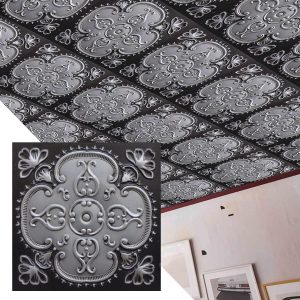 n is a breeze, requiring just a tape measure, scissors, and glue – perfect for DIY enthusiasts! Our versatile designs allow you to redefine your space, adding style and elegance with ease.
n is a breeze, requiring just a tape measure, scissors, and glue – perfect for DIY enthusiasts! Our versatile designs allow you to redefine your space, adding style and elegance with ease.By choosing Dundee Deco, you’ll enjoy:
-
High-quality products
-
Expert guidance
-
Competitive pricing
-
Wide selection of ceiling tiles, including decorative, acoustic, and PVC ceiling tiles
How do I choose the right size of PVC ceiling panel for my room?
Now, let’s find the perfect ceiling tile size for your room. Choosing the right size is crucial for a cohesive look. Here are some expert tips:
To start, measure your room’s length and width to determine the square footage. Next, check your interior ceiling grid to ensure our tiles fit seamlessly – most grids accommodate 2×2 or 2×4 feet tiles. Consider your ceiling height, too. Larger sheets for high ceilings and smaller ones for lower ceilings.
Finally, think about your design preferences. Do you have a modern, minimalist style or a traditional, ornate look? Choose a tile size that complements your aesthetic.
Choosing Dundee Deco means you’ll be getting a wide selection of high-quality products, expert guidance, and competitive pricing, all under one roof.
Installing Ceiling Tiles: A Step-by-Step Guide
Before You Begin:
First, measure and plan the area you want to cover with ceiling tiles. Take a moment to consider the size and shape of the tiles, as well as any existing fixtures or obstructions. This will help you create a seamless and polished layout.
Next, gather all the necessary tools and materials, including adhesive, a putty knife, a level, a utility knife, and a measuring tape. Having everything you need within reach will save you time and effort in the long run.
By taking these initial steps, you’ll be well-prepared to tackle your ceiling tile installation with confidence. Remember, proper planning and preparation are key to achieving a beautiful and professional-looking result.
Installation Steps:
Prepare the Ceiling: Ensure the ceiling surface is clean, dry, and free of any loose paint or debris. If necessary, repair any damage to the ceiling.
Mark the Layout: Use a pencil and a level to mark the layout for the ceiling tiles on the ceiling surface.
Apply Adhesive: Apply the adhesive to the back of the first ceiling tile according to the manufacturer’s instructions.
Position the Tile: Carefully position the tile on the marked area, ensuring it’s aligned correctly. Press firmly to secure the adhesive.
Smooth Out Bubbles: Use a putty knife or a squeegee to smooth out any bubbles or wrinkles.
Install Subsequent Tiles: Repeat steps 3-5 for the remaining ceiling tiles, ensuring they are aligned properly and that the edges overlap seamlessly.
Trim Edges: If necessary, use a utility knife to trim the edges of the ceiling tiles to fit the space.
Caulk Seams: Apply caulk along the seams between the tiles to create a finished look and prevent moisture from seeping through.
Install Fixtures: Once the ceiling tiles are in place, reinstall any fixtures, such as lights or smoke detectors.
Additional Tips:
Ventilation: Ensure proper ventilation during and after installation to allow the adhesive to dry completely.
Safety First: Wear protective gear, such as gloves and eye protection, during the installation process.
By following these steps, you can successfully install and transform the appearance of your space.
FAQ
How much do decorative ceiling tiles cost?
On average, basic interior ceiling tiles can cost between $0.50 to $1.50 per square foot, while more high-end and decorative options can range from $3 to $15 per square foot.
The cost of interior ceiling tiles can vary depending on the type of material, size, design, and quantity needed.
How long do interior ceiling tiles last?
Generally, high-quality ceiling tiles made from durable materials like mineral fiber, vinyl, or metal can last for 10-15 years or more with proper care and maintenance.
The lifespan of ceiling panels can vary depending on the type of material, installation, maintenance, and other factors.
What is a normal ceiling tile size?
The standard size for a ceiling tile is 2 feet by 2 feet or 2 feet by 4 feet. These sizes are designed to fit into a standard suspended ceiling grid system commonly used in commercial and residential buildings.
Some manufacturers also offer smaller or larger tile sizes and custom sizes and shapes for specific applications or design preferences. It’s important to ensure that the tiles you choose are compatible with your grid system and properly sized to fit your space.
What type of ceiling tile is best?
The type of interior ceiling panel that is best for your space will depend on a variety of factors, such as your budget, design preferences, and performance needs. Here are some common types of interior ceiling tiles and their benefits:
Mineral fiber tiles: They are made from a blend of mineral wool and other fibers and are known for their sound absorption, fire resistance, and thermal insulation properties. They are a popular choice for commercial buildings and can be painted or textured to match any design style.
PVC tiles: They are durable, waterproof, and easy to clean, making them a popular choice for areas with high moisture or humidity levels. They are also resistant to mold and mildew growth and can come in a variety of colors and patterns.
Metal panels: These are durable, fire-resistant, and can provide a sleek, modern look to any space. They are also easy to clean and maintain and can be customized with different finishes and designs.
Ultimately, the best drop ceiling tile for your space will depend on your specific needs and preferences. Consider factors such as durability, ease of maintenance, acoustic performance, and design aesthetics when making your decision.
Can I install interior ceiling tiles over my existing ceiling?
Yes, in most cases, you can install drop ceiling tiles over your existing ones. However, it’s important to ensure that your existing ceiling is structurally sound and able to support the weight of the new drop ceiling.
How do I clean and maintain my panels?
Regularly dust your panels with a soft-bristled brush or vacuum cleaner attachment to clean and maintain them.
For stains or marks, use a mild detergent solution and a soft cloth for spot cleaning. Avoid harsh chemicals and abrasive cleaners, which can damage the tiles.
Preventing water damage is also crucial to ensure longevity.

